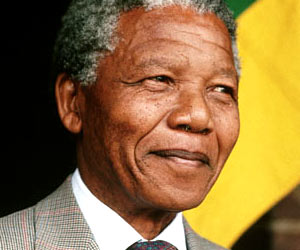
Nelson Mandela's story, if told as a novel, would not be deemed possible in real life. Worse, we don't tell such stories in many of our novels.
A violent young rebel is imprisoned for decades but turns that imprisonment into the training he needs. He turns to negotiation, diplomacy, reconciliation. He negotiates free elections, and then wins them. He forestalls any counter-revolution by including former enemies in his victory. He becomes a symbol of the possibility for the sort of radical, lasting change of which violence has proved incapable. He credits the widespread movement in his country and around the world that changed cultures for the better while he was locked away. But millions of people look to the example of his personal interactions and decisions as having prevented a blood bath.
Mandela was a rebel before he had a cause. He was a fighter and a boxer. Archbishop Desmond Tutu says that South Africa benefited greatly from the fact that Mandela did not emerge from prison earlier: 'Had he come out earlier, we would have had the angry, aggressive Madiba. As a result of the experience that he had there, he mellowed. ... Suffering either embitters you or, mercifully, ennobles you. And with Madiba, thankfully for us, the latter happened.'
Mandela emerged able to propose reconciliation because he'd had the time to think it through, because he'd had the experience of overcoming the prisons' brutality, because he'd been safely locked up while others outside were killed or tortured, and also -- critically -- because he had the authority to be heard and respected by those distrustful of nonviolence........
The United States needs that example when speaking with Iran. Colombia needs it as the possibility of peace glimmers in the distance there. Syrian builders of movements and military organizations that fight injustice need that example desperately.
When will we ever learn?
David Swanson Warisacrime.org December5 , 2013
Missionaries of the Sacred Heart from the Irish Province and Daughters of Our Lady of the Sacred Heart worked in South Africa during the apartheid years and the years since, in Cape Town and southern cities, outside Johannesburg, in the township of Ivory Park, and in Pretoria. They began the diocese in the north, then called Louis Trichardt. Australians like Vince Carroll MSC and Sally Duigan FDNSC have worked in South Africa as well.
The Union of Superiors General held its 82nd General Assembly in the Salesianum in Rome
Who we are
Missionaries of the Sacred Heart, an Australian community, in a worldwide religious congregation.
Ministry Mission
Jesus loved with a human heart: with him we proclaim his love to the world.
Peace, Justice, Creation
We work to discover through advocacy, healing and reconciliation, God's presence in our world.
Spirituality
We are to be on earth the heart of God. God has no other heart but ours.

Nelson Mandela's story, if told as a novel, would not be deemed possible in real life. Worse, we don't tell such stories in many of our novels.
A violent young rebel is imprisoned for decades but turns that imprisonment into the training he needs. He turns to negotiation, diplomacy, reconciliation. He negotiates free elections, and then wins them. He forestalls any counter-revolution by including former enemies in his victory. He becomes a symbol of the possibility for the sort of radical, lasting change of which violence has proved incapable. He credits the widespread movement in his country and around the world that changed cultures for the better while he was locked away. But millions of people look to the example of his personal interactions and decisions as having prevented a blood bath.
Mandela was a rebel before he had a cause. He was a fighter and a boxer. Archbishop Desmond Tutu says that South Africa benefited greatly from the fact that Mandela did not emerge from prison earlier: ‘Had he come out earlier, we would have had the angry, aggressive Madiba. As a result of the experience that he had there, he mellowed. ... Suffering either embitters you or, mercifully, ennobles you. And with Madiba, thankfully for us, the latter happened.’
Mandela emerged able to propose reconciliation because he'd had the time to think it through, because he'd had the experience of overcoming the prisons' brutality, because he'd been safely locked up while others outside were killed or tortured, and also -- critically -- because he had the authority to be heard and respected by those distrustful of nonviolence……..
The United States needs that example when speaking with Iran. Colombia needs it as the possibility of peace glimmers in the distance there. Syrian builders of movements and military organizations that fight injustice need that example desperately.
When will we ever learn?
David Swanson Warisacrime.org December5 , 2013
Missionaries of the Sacred Heart from the Irish Province and Daughters of Our Lady of the Sacred Heart worked in South Africa during the apartheid years and the years since, in Cape Town and southern cities, outside Johannesburg, in the township of Ivory Park, and in Pretoria. They began the diocese in the north, then called Louis Trichardt. Australians like Vince Carroll MSC and Sally Duigan FDNSC have worked in South Africa as well.